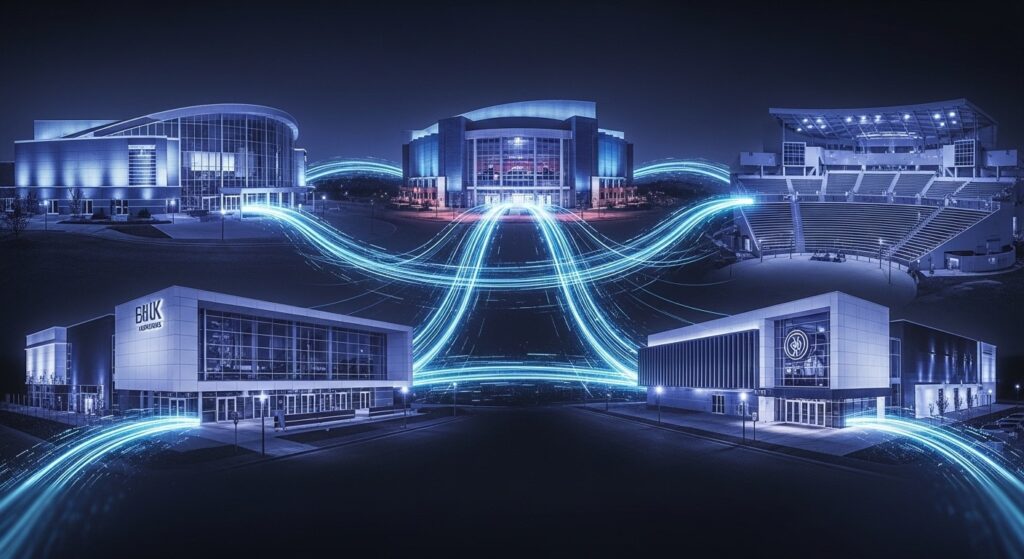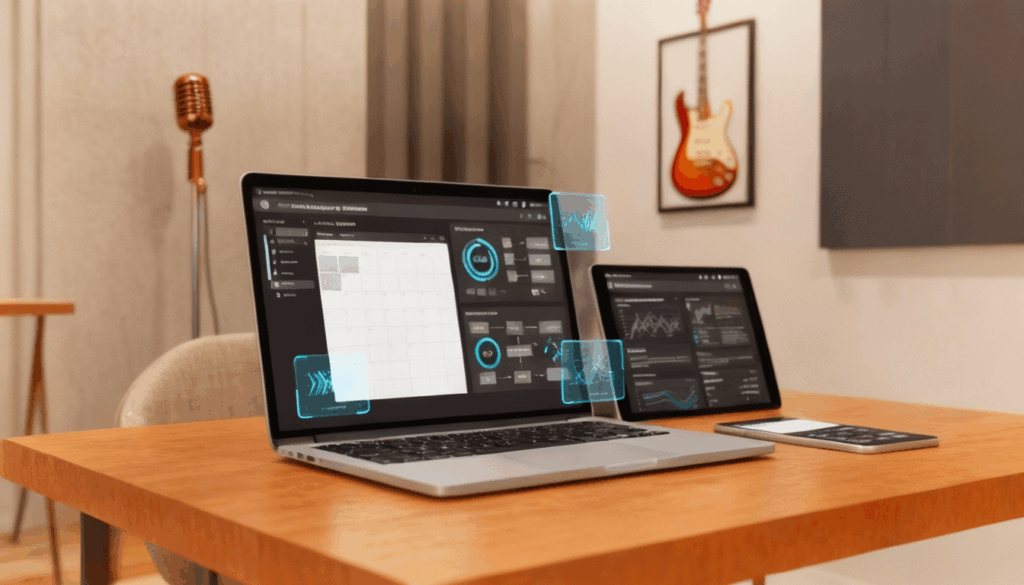
Best Booking Software for Managing Multiple Live Music Venues
Multi-venue operators need specialized booking software for music venues that scales with growth, not generic event platforms that break under pressure.
- Centralized management eliminates operational chaos across venue portfolios.
- Real-time analytics drive strategic venue expansion decisions.
- Integrated workflows prevent double-bookings and maximize utilization.
- Music-specific features outperform generic event management platforms.
Choose specialized booking software for music venues built for multi-location operations over one-size-fits-all solutions that limit growth.
Multi-venue music operators face unique challenges that generic event software can’t handle. Coordinating talent across locations with different technical requirements, capacity constraints, and operational demands requires precision that standard platforms lack.
The event management software market jumped from $15.5 billion in 2024 to a projected $34.7 billion by 2029. Venue operators driving this growth recognize that specialized tools, such as booking software for music venues, directly impact profitability.
Why Booking Software for Music Venues Beats Generic Platforms
Generic event software requires separate instances for each venue, creating data silos that prevent portfolio-level insights. You end up juggling multiple calendars, contact databases, and financial reports. This fragmentation causes double-bookings, missed opportunities, and escalating inefficiencies.
Music venues operate differently than corporate events. Artists have complex touring schedules, co-promotion deals require intricate profit calculations, and settlements must account for venue-specific variables. Generic platforms lack these music industry capabilities that multi-venue operators depend on.
Essential Multi-Venue Event Software Features
Multi-venue success hinges on three core capabilities that separate specialized platforms from generic event management tools. These foundational features determine whether your venue booking system becomes a strategic asset or operational bottleneck as your portfolio grows.
How Does Centralized Calendar Management Transform Operations?
Effective multi-venue event software provides master calendar views displaying availability, holds, and confirmed shows across your entire portfolio. Advanced systems filter by venue, date range, or artist while spotting conflicts and opportunities across locations.
Look for platforms that integrate with external calendars and offer customizable permissions. Team members access venue-specific information without compromising sensitive data from other locations.
What Analytics Do Multi-Venue Operators Actually Need?
Multi-venue operators need consolidated reporting showing venue utilization rates, ticket sales averages, and revenue per show across all locations. This analytical capability drives strategic decisions about venue expansion, artist routing, and resource allocation.
Effective venue booking systems aggregate data from multiple venues, identifying top-performing locations, seasonal patterns, and optimization opportunities.

How Should User Management Scale Across Venues?
Managing staff across venues requires sophisticated permission systems allowing venue-specific access with centralized oversight. Quality venue CRM platforms create custom user roles aligning with organizational structure.
Venue managers get full access to their location’s bookings plus read-only access to other venues for coordination. Production managers access technical information across all venues without seeing financial details.
Financial Management Across Venues
The complexity of running multiple venue financials multiplies exponentially with each location, creating reconciliation nightmares that spreadsheets can’t handle. Advanced venue booking systems automate the financial intricacies that make or break multi-location profitability.
Why Is Consolidated Revenue Tracking Critical?
Multi-venue booking software provides real-time revenue tracking across all locations, including ticket sales integration, merchandise splits, and co-promotion settlements. Advanced platforms calculate venue-specific costs while rolling up portfolio-level performance data.
This consolidated view identifies which venues drive profitable shows and reveals improvement opportunities across your portfolio.
How Do Co-Promotion Deals Scale Across Venues?
Co-promotion deals are standard in multi-venue operations. Sophisticated venue booking systems include dedicated modules that calculate profit splits, track partner contributions, and automatically generate settlement reports.
This automation prevents costly manual errors when managing complex deals across venues with different cost structures and revenue streams.

Technology Integration Requirements
Multi-venue operators juggle dozens of platforms for ticketing, accounting, marketing, and staff management across locations. Without seamless integrations, you’re manually entering the same data multiple times while increasing your risk of errors.
Which Integrations Matter Most for Multi-Venue Success?
Multi-venue event software must integrate with ticketing platforms, accounting systems, and customer management tools. These connections ensure seamless data flow, reduce manual entry, and minimize errors.
Ticket sales data from different platforms automatically updates venue calendars and financial reports across all locations.
Why Is Mobile Access Non-Negotiable for Multi-Venue Operators?
Multi-venue operators need full mobile functionality through apps or responsive interfaces. Managers check availability, approve bookings, and monitor metrics from any location.
Mobile access enables real-time coordination of last-minute changes and time-sensitive booking opportunities without desktop dependency.

Advanced Scaling Features
Basic venue booking systems handle current operations, but advanced platforms anticipate future complexity before it becomes overwhelming. These intelligence-driven features separate growing venue portfolios from those that plateau due to operational limitations.
What Workflows Should Be Automated in Multi-Venue Operations?
Multi-venue booking software automates routine tasks, such as contract reminders, calendar updates, and document generation. Advanced systems automatically handle deposit reminders, technical requirement updates, and staff coordination.
This automation becomes exponentially valuable as portfolios grow, freeing managers for strategic decisions over administrative tasks.
How Can Predictive Analytics Drive Multi-Venue Strategy?
Sophisticated platforms leverage portfolio data to provide predictive insights about market trends and booking opportunities. Systems identify artist popularity patterns, seasonal demand fluctuations, and optimal pricing strategies based on historical performance.
This intelligence drives strategic planning, optimal tour routing, and competitive positioning across markets.
How Multi-Venue Software Transforms Operations
Specialized multi-venue booking software delivers immediate improvements by eliminating redundancy and providing real-time strategic insights. Integrated platforms improve venue utilization through better visibility and enhanced artist routing coordination.
Automated settlement processes prevent errors that cost venues significant money on complex co-promotion deals. When systems efficiently handle multi-venue complexity, operators can focus on growth opportunities rather than operational struggles.
Implementation Strategy
Moving multiple venues from disparate systems to unified booking software can either streamline operations or create temporary chaos. Smart strategy determines whether your transition enhances productivity immediately or disrupts revenue for months.
How Should Multi-Venue Operators Approach Data Migration?
Established multi-venue operations need comprehensive migration services that preserve historical booking data, artist contacts, and financial records across all venues. Quality providers offer dedicated implementation support, importing data from various sources without extensive manual work.
What Training Approach Works Best for Multi-Venue Teams?
Live music event software should be intuitive enough for venue managers, production staff, and administrators to adopt quickly. Successful implementations include role-specific training teaching relevant features.
Choose providers offering ongoing training resources and responsive support, ensuring smooth adoption across all locations.
Future-Proofing Multi-Venue Operations
The live music industry evolves rapidly with emerging trends like hybrid events, dynamic pricing, and enhanced fan experiences. Multi-venue operators need booking software that adapts to changes rather than limiting opportunity.
Advanced platforms incorporate AI for predictive analytics, automated decisions, and enhanced fan engagement. These capabilities provide competitive advantages in attracting artists, optimizing pricing, and creating experiences that drive repeat business.
Forward-thinking venue booking systems integrate with contactless payments, augmented reality, and real-time crowd management. These integrations enable cutting-edge experiences that differentiate your venues from competitors using outdated systems.
Investment ROI Considerations
The right booking software for music venues requires evaluating immediate operational needs and long-term growth objectives. Total ownership costs include software fees, implementation time, training requirements, and opportunity costs of inefficient systems.
Multi-venue operators achieve ROI through improved efficiency, reduced errors, and enhanced revenue optimization. Long-term value comes from platforms supporting continued growth and industry adaptation.
According to industry research, medium-sized venues (1,001–10,000 capacity) dominate with 48.87% of the U.S. live music market. The industry supports over 234,000 jobs globally, demonstrating the scale and importance of efficient venue management systems.

Top Multi-Venue Software Selection Criteria
When evaluating venue CRM and booking platforms, prioritize these capabilities:
- Unified data preventing venue silos
- Real-time cross-venue reporting for strategic decisions
- Automated settlement calculations for complex co-promotion deals
- Mobile-first design enabling remote management
- Robust integration connecting existing business tools
- Scalable user permissions growing with organizational structure
Frequently Asked Questions
What separates multi-venue booking software from single-venue systems? Multi-venue platforms provide centralized management across locations with consolidated reporting, cross-venue analytics, and unified permissions. Single-venue systems require separate instances, creating data silos that prevent portfolio insights.
How quickly can multi-venue operators implement new booking software? Implementation typically takes 4-8 weeks, depending on portfolio size and complexity. Quality providers offer dedicated migration services, preserving historical data while enabling immediate access to new capabilities.
Do venue booking systems integrate with existing ticketing platforms? Advanced platforms integrate with major ticketing systems, accounting software, and customer management tools, ensuring seamless data flow and reduced manual entry across operations.
What ROI should multi-venue operators expect from specialized software? Venues see improvements in operational efficiency, reduced booking errors, and optimized pricing strategies. Benefits include streamlined settlements, improved cash flow management, and better resource allocation across portfolios.
Scale Your Venue Empire With Confidence
Multi-venue success requires specialized booking software for music venues built for industry-specific challenges. Generic event platforms create operational bottlenecks that constrain growth and profitability. When your venue booking system scales seamlessly with ambitions, you focus on creating unforgettable live music experiences that drive repeat business.
Prism’s specialized platform is built by music pros and designed for venue portfolio management. Get started today and discover how purpose-built booking software can streamline your venue operations, boost profitability, and position your business for continued growth.

Matt Ford is the founder and CEO of Prism.fm, an Austin-based software company revolutionizing live music event management. With a background in entrepreneurship and a degree from the University of Wisconsin-Madison School of Business, Ford combined his self-taught coding skills with firsthand experience as a concert promoter to address the inefficiencies he observed in the industry. In 2018, he launched Prism.fm, an all-in-one platform designed to streamline operations for venues, promoters, and agencies by replacing cumbersome spreadsheets with integrated tools for booking, financial tracking, and contract management. Under his leadership, Prism.fm has grown significantly, achieving $3 million in annual recurring revenue post-COVID and securing over $15 million in funding . Ford’s commitment to building user-centric solutions has positioned Prism.fm as a trusted partner for over 1,500 venues and promoters worldwide.



